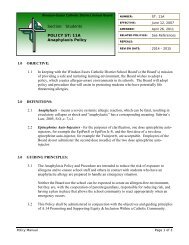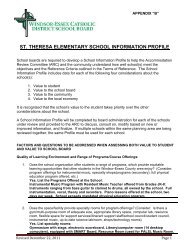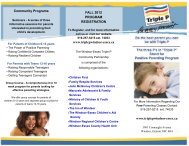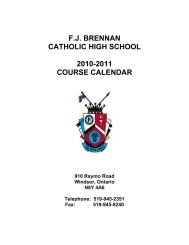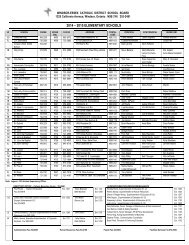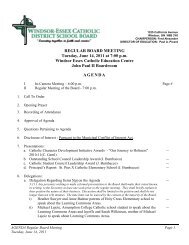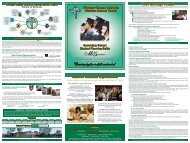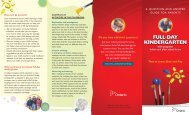- Page 1 and 2: 1325 California AvenueWindsor, ON N
- Page 3 and 4: 2008 Special Education Plan Amendme
- Page 5 and 6: 2008 Special Education Plan Amendme
- Page 7 and 8: 2008 Special Education Plan Amendme
- Page 9 and 10: 2008 Special Education Plan Amendme
- Page 11 and 12: 2008 Special Education Plan Amendme
- Page 13 and 14: 2008 Special Education Plan Amendme
- Page 15 and 16: 2008 Special Education Plan Amendme
- Page 17 and 18: 2008 Special Education Plan Amendme
- Page 19 and 20: 2008 Special Education Plan Amendme
- Page 21 and 22: 2008 Special Education Plan Amendme
- Page 23 and 24: 2008 Special Education Plan Amendme
- Page 25 and 26: 2008 Special Education Plan Amendme
- Page 27 and 28: 2008 Special Education Plan Amendme
- Page 30 and 31: CODE:2008 Special Education Plan Am
- Page 32 and 33: CODE:2008 Special Education Plan Am
- Page 34 and 35: 2008 Special Education Plan Amendme
- Page 36 and 37: OPA:2008 Special EducationOntarioPl
- Page 38 and 39: OPA:2008 Special EducationOntarioPl
- Page 40 and 41: OPA evidence to date:2008 Special E
- Page 42 and 43: 2008 Special Education Plan Amendme
- Page 46 and 47: 2008 Special Education Plan Amendme
- Page 48 and 49: 2008 Special Education Plan Amendme
- Page 50 and 51: Empower program developed by Lovett
- Page 52 and 53: 2008 Special Education Plan Amendme
- Page 54 and 55: 2008 Special Education Plan Amendme
- Page 56 and 57: 2008 Special Education Plan Amendme
- Page 58 and 59: 2008 Special Education Plan Amendme
- Page 60 and 61: 2008 Special Education Plan Amendme
- Page 62 and 63: 2008 Special Education Plan Amendme
- Page 64 and 65: 2008 Special Education Plan Amendme
- Page 66 and 67: 2008 Special Education Plan Amendme
- Page 68 and 69: 2008 Special Education Plan Amendme
- Page 70 and 71: 2008 Special Education Plan Amendme
- Page 72 and 73: 2008 Special Education Plan Amendme
- Page 74 and 75: 2008 Special Education Plan Amendme
- Page 76 and 77: 2008 Special EducationGradePlan Ame
- Page 78 and 79: 2008 Special Education Plan Amendme
- Page 80 and 81: 2008 Special Education Plan Amendme
- Page 82 and 83: 2008 Special Education Plan Amendme
- Page 84 and 85: 2008 Special Education Plan Amendme
- Page 86 and 87: 2008 Special Education Plan Amendme
- Page 88 and 89: 2008 Special Education Plan Amendme
- Page 90 and 91: 2008 Special Education Plan Amendme
- Page 92 and 93: 2008 Special Education Plan Amendme
- Page 94 and 95:
2008 Special Education Plan Amendme
- Page 96 and 97:
2008 Special Education Plan Amendme
- Page 98 and 99:
2008 Special Education Plan Amendme
- Page 100 and 101:
2008 Special Education Plan Amendme
- Page 102 and 103:
1.0 Report on Costs / ActivitiesOPA
- Page 104 and 105:
ItemOther ContractProfessionals (e.
- Page 106 and 107:
OPA STUDENT ASSESSMENT PROJECTSCHOO
- Page 108 and 109:
OPA STUDENT ASSESSMENT PROJECTSCHOO
- Page 110 and 111:
OPA STUDENT ASSESSMENT PROJECTSCHOO
- Page 112 and 113:
2008 Special Education Plan Amendme
- Page 114 and 115:
2008 Special Education Plan Amendme
- Page 116 and 117:
2008 Special Education Plan Amendme
- Page 118 and 119:
2008 Special Education Plan Amendme
- Page 120 and 121:
2008 Special Education Plan Amendme
- Page 122 and 123:
2008 Special Education Plan Amendme
- Page 124 and 125:
2008 Special Education Plan Amendme
- Page 126 and 127:
2008 Special Education Plan Amendme
- Page 128 and 129:
2008 Special Education Plan Amendme
- Page 130 and 131:
2008 Special Education Plan Amendme
- Page 132 and 133:
2008 Special Education Plan Amendme
- Page 134 and 135:
2008 Special Education Plan Amendme
- Page 136 and 137:
2008 Special Education Plan Amendme
- Page 138 and 139:
2008 Special Education Plan Amendme
- Page 140 and 141:
2008 Special Education Plan Amendme
- Page 142 and 143:
5/16/20082008 1Simone Special Lira
- Page 144 and 145:
2008 Special Education Plan Amendme
- Page 146 and 147:
2008 Special Education Plan Amendme
- Page 148 and 149:
2008 Special Education Plan Amendme
- Page 150 and 151:
Policy ST:05 Student Discipline Pol
- Page 152 and 153:
Policy ST:05 Student Discipline Pol
- Page 155 and 156:
Policy ST:05 Student Discipline Pol
- Page 157 and 158:
2008 Special Education Plan Amendme
- Page 159 and 160:
Procedure Pr ST: 05 Student Discipl
- Page 161 and 162:
Procedure Pr ST: 05 Student Discipl
- Page 163 and 164:
Procedure Pr ST: 05 Student Discipl
- Page 165 and 166:
Procedure Pr ST: 05 Student Discipl
- Page 167 and 168:
Procedure Pr ST: 05 Student Discipl
- Page 169 and 170:
Procedure Pr ST: 05 Student Discipl
- Page 171 and 172:
Procedure Pr ST: 05 Student Discipl
- Page 173 and 174:
Procedure Pr ST: 05 Student Discipl
- Page 175 and 176:
Procedure Pr ST: 05 Student Discipl
- Page 177 and 178:
Procedure Pr ST: 05 Student Discipl
- Page 179 and 180:
Procedure Pr ST: 05 Student Discipl
- Page 181 and 182:
Procedure Pr ST: 05 Student Discipl
- Page 183 and 184:
Procedure Pr ST: 05 Student Discipl
- Page 185 and 186:
Procedure Pr ST: 05 Student Discipl
- Page 187 and 188:
Procedure Pr ST: 05 Student Discipl
- Page 189 and 190:
Procedure Pr ST: 05 Student Discipl
- Page 191 and 192:
Procedure Pr ST: 05 Student Discipl
- Page 193 and 194:
Procedure Pr ST: 05 Student Discipl
- Page 195 and 196:
Procedure Pr ST: 05 Student Discipl
- Page 197 and 198:
Procedure Pr ST: 05 Student Discipl
- Page 199 and 200:
Procedure Pr ST: 05 Student Discipl
- Page 201 and 202:
Policy SC: 18 Bullying Prevention a
- Page 203 and 204:
Policy SC: 18 Bullying Prevention a
- Page 205 and 206:
Procedure Pr SC: 18 Bullying Preven
- Page 207 and 208:
2008 Special Education Plan Amendme
- Page 209 and 210:
Policy SC: 15 Code of Conduct2008 S
- Page 211 and 212:
Policy SC: 15 Code of Conduct2008 S
- Page 213 and 214:
Policy SC: 15 Code of Conduct2008 S
- Page 215 and 216:
2008 Special Education Plan Amendme
- Page 217 and 218:
2008 Special Education Plan Amendme
- Page 219 and 220:
2008 Special Education Plan Amendme
- Page 221 and 222:
2008 Special Education Plan Amendme
- Page 223 and 224:
2008 Special Education Plan Amendme
- Page 225 and 226:
2008 Special Education Plan Amendme
- Page 227 and 228:
Greater Essex County District Schoo
- Page 229 and 230:
2008 Special Education Plan Amendme
- Page 231 and 232:
2008 Special Education Plan Amendme
- Page 233 and 234:
2008 Special Education Plan Amendme
- Page 235 and 236:
2008 Special Education Plan Amendme
- Page 237 and 238:
2008 Special Education Plan Amendme
- Page 239 and 240:
2008 Special Education Plan Amendme
- Page 241 and 242:
2008 Special Education Plan Amendme
- Page 243 and 244:
2008 Special Education Plan Amendme
- Page 245 and 246:
2008 Special Education Plan Amendme
- Page 247 and 248:
2008 Special Education Plan Amendme
- Page 249 and 250:
2008 Special Education Plan Amendme
- Page 251 and 252:
2008 Special Education Plan Amendme
- Page 253 and 254:
3special education expenditures. Ca
- Page 255 and 256:
2008 Special Education Plan Amendme
- Page 257 and 258:
3to develop a long-term sustainable
- Page 259 and 260:
2008 Special Education Plan Amendme
- Page 261 and 262:
2008 Special Education Plan Amendme
- Page 263 and 264:
2008 Special Education Plan Amendme
- Page 265 and 266:
2008 Special Education Plan Amendme



